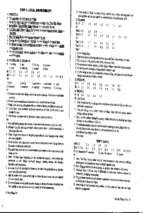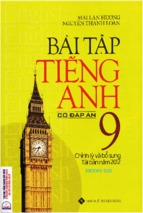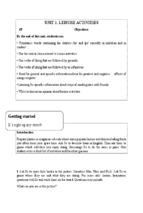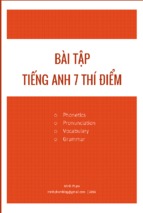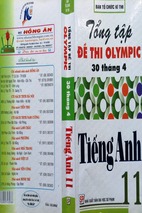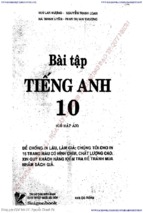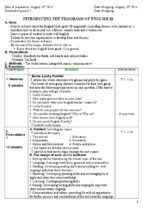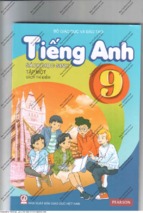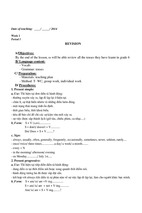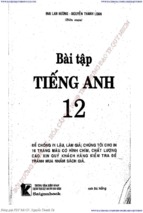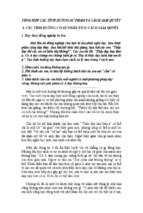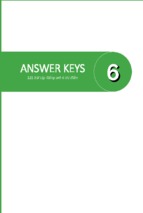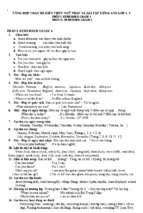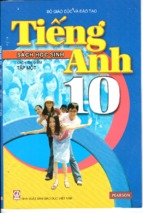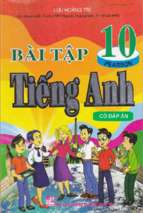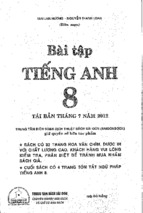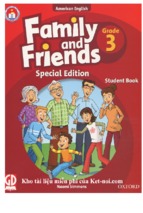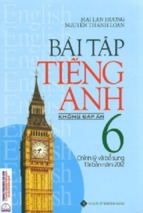ĐỀ CƯƠNG ÔN TẬP HỌC KỲ LỚP 7
A. PHONETICS
I. Find the word which has a different sound in the part underlined.
1. A. prefer
B. better
C. teacher
2. A. bear
B. hear
C. dear
3. A. collect
B. concern
C. concert
4. A. absent
B. government
C. dependent
5. A. future
B. return
C. picture
II. Find the word which has a different sound in the part underlined.
1. A. bird
B. girl
C. first
2. A. burn
B. sun
C. hurt
3. A. nurse
B. picture
C. surf
4. A. neighbor
B. favorite
C. culture
5. A. hobby
B. hour
C. hotel
III. Find the word which has a different sound in the part underlined.
1. A. collection
B. tradition
C. exhibition
D. worker
D. near
D. combine
D. enjoy
D. culture
D. sister
D. turn
D. return
D. tourist
D. hot
D. question
2. A. usually
B. leisure
C. version
D. composer
3. A. closure
B. leisure
C. pleasure
D. sure
4. A. essential
B. traditional
C. picture
D. audition
5. A. discussion
B. vision
C. treasure
D. decision
6. A. painter
B. prefer
C. concert
D. perform
7. A. music
B.so
C. saxophone
D. expensive
8. A. actor
B. guitarist
C. attract
D. gallery
9. A. hard
B. talent
C. happy
D. Similarity
10. A. musical
B. delicious
C. special
D. physician
B. GRAMMAR
I. TENSES
Exercise 1: Put the verbs in the brackets into correct tense or form:
1. Keep silent, please. Our teacher (explain) _________________ the lesson.
2. We (be) _________________ students for four years.
3. I will send him the message as soon as he (return) _________________
4. Thanks for (invite) _________________ me to the birthday party.
5. Peter couldn’t read until he (be) _________________ eight years old.
6. What ____________ your father usually ____________ (do) in the evenings?
7. I can (see) _________________ the children. They (play) ______________ in the yard.
8. Would you like (listen) _________________ to music?
9. No, thanks. I like (read) _________________ books.
10. Don’t worry. I (give) ____________ him your message when I (see) __________ him.
11. You (think) _________ collecting stamps costs much money?
12. My father thinks mountain climbing (be) _________ more dangerous than skating.
13. Every year, my mother (give) _________ me a nice doll on my birthday.
14. My brother (not like) _________ collecting stamps, he likes collecting glass bottles.
1
15. My sister likes (cook) _________ very much. She can cook many good foods.
Exercise 2: Put the verbs in the brackets into correct tense or form:
16. Does your brother like (listen) _________ to music in his free time?
17. I think in the future, more people (enjoy) _________ going out by bicycles.
18. My father says when he's retired, he (go) _________ back to his village to do the gardening.
19. We are planting trees around our school now. Our school (be) _________ surrounded by a lot of green trees.
20. Lan says she loves collecting pens but she (not/continue) _________ this hobby from next year.
21. When I was a child, I used (dream) ________________ of being an astronaut.
22. I'm terribly nervous. I'm not used (speak) ________________ to a large audience.
23. It took us ages to get used (live) ________________ in an apartment house.
24. Lots of trains used (stop) ________________ here, but not many do now.
25. Didn't Nick use (work) ________________ on a building site?
26. She may be late if she (not hurry) ________________.
27. If you are kind to me, I (be) ________________good to you.
28. If he (give) ________________ up smoking, as his doctor orders, he will be soon well again.
29. You (not pass) ________________ your driving test unless you drive more carefully.
30. He’ll be ill if he (not stop) ________________ worrying so much.
II. Too, So, Neither, Either.
Exercise 1: Fill in the gaps with “so, too, either, neither”
1. He is planting some trees, and I am, ………………..
2. She speaks English fluently, and ………………. does Lien.
3. He can’t write letters in English, and ………………..can his younger brother.
4. I’m not hungry and you aren’t, ………………..
5. Mr.Nam doesn’t like to eat fish and ………………..does his wife.
6. He likes pineapples and ………………..do I.
7. You can do this exercise well and I can, ………………..
8. They don’t drink wine and we don’t ………………..
Exercise 2: Combine into sentence, using “so, too, either, neither”
1. We won’t stay here. They won’t stay here.
..........................................................................................................................................
2. She is studying her lesson. I am studying my lesson.
..........................................................................................................................................
3. He can’t swim. His sister can’t swim.
..........................................................................................................................................
4. My son likes to drink milk. I like to drink milk.
..........................................................................................................................................
5. She doesn’t like candy. He doesn’t like candy.
..........................................................................................................................................
6. You should brush your teeth after meals. They should brush their teeth after meals.
..........................................................................................................................................
Exercise 3: Combine into sentence, using “so, too, either, neither”
1. My dog never barks, and (YOUR DOGS)
____________________________________________________
2. You have to take a bath right away, and (SHE)
____________________________________________________
3. She's like to join in the army, and (HE)
____________________________________________________
4. We'd rather go to school on time, and (TOM)
____________________________________________________
5. Every thing is not OK, and (THIS PROBLEM)
____________________________________________________
6. Nothing can prevent him from going there, and (YOU)
2
____________________________________________________
7. Everyone knows him, and (I)
____________________________________________________
8. Nobody knew why he was absent, and (I)
____________________________________________________
9. The workers must be working very hard, and (YOU)
____________________________________________________
10. You'd have come, and (I)
____________________________________________________
III. ADVERB CLAUSES OF RESULT AND PURPOSE
1. ADVERB CLAUSES OF RESULTS
Là mệnh đề trạng ngữ chỉ kết quả bắt đầu các liên từ: so (vì vậy), so ... that (quá ... đến nỗi)
S +V+ SO + S + V
E.g.:
He works hard, so he earns a lot of money.
Cậu ấy làm việc chăm vì vậy cậu ấy kiếm nhiều tiền.
S +V+ SO + ADJ/ ADV THAT + S + V
E.g.: He is so sleepy that he cannot watch T.V.
Cậu ấy quá buồn ngủ đến nỗi cậu ấy không thể xem T.V.
2. ADVERB CLAUSES OF PURPOSE:
Là mệnh đề trạng ngữ chỉ mục đích bắt đầu các liên từ: so that, in order that (để mà)
S +V+ SO THAT + S + (can/ could/will/ would/ may/ might) + V 1
E.g.:He works hard so that he can have enough money to buy a new house.
Cậu ấy làm vi chăm để có thể có đủ tiền mua nhà mới.
Exercise 1: Join two sentences into one using “so, so ... that”:
1. Lan and Ba don’t have a tent. They never go camping
...................................................................................................................................................
2. I have to stay at home. I can finish all my exercises.
...................................................................................................................................................
3. Tan is very slow. He is late for school.
...................................................................................................................................................
4. The weather is fine. We have a picnic on the mountain.
...................................................................................................................................................
5. I don’t have a bike. I walk.
...................................................................................................................................................
6. Nhan is tired. He can’t fly his kites.
...................................................................................................................................................
7. The book is very interesting. I read it twice.
...................................................................................................................................................
8. Jane looks sick. The nurse tells her to go back home to rest.
...................................................................................................................................................
9. The lesson is very difficult. No one can understand it.
...................................................................................................................................................
10. The work is very hard. I can’t finish it on time.
...................................................................................................................................................
Exercise 2: Join two sentences into one, use SO THAT/ IN ORDER THAT:
1. The boy stands on the benches. He wants to see the view better.
→The boy stands on the benches so that he can see the view better.
2. I’ll write to you. I want you to know my decision.
...................................................................................................................................................
3. The man speaks loudly. He wants every one to hear him clearly.
...................................................................................................................................................
4. You should walk slowly. Your sister can follow you.
3
...................................................................................................................................................
5. John gets up early. he doesn’t want to be late for the class.
...................................................................................................................................................
6. I wish to have enough money. I want to buy a new house.
...................................................................................................................................................
7. She needs a job. She wants to support her old parents.
...................................................................................................................................................
8. She puts on her warm clothes. She doesn’t want to catch cold.
...................................................................................................................................................
9. It was so dark. I couldn’t see anything.
...................................................................................................................................................
III. GENERAL STRUCTURES
A.
Structures
I. V-bare
1. S + used to/ would rather/ had better/can ...+ Vo.
Examples
He‘d rather stay at home than go out.
2. S + keep/ make/ let/ have + O + Vo. (active)
Tom has his father fix the ball for him.
3. S + see/ hear/ notice/ watch + O + Vo.
I saw the girl sing a song.
II. To-V
4. S+ V+ adj/ adv + enough + (for O) + to V
Ai đủ .... làm gì / (Điều gì) đủ cho ai để làm gì.
Tom isn’t old enough to go to school.
Tom không đủ tuổi để đi học.
5. S+ V+ too +adj / adv + (for O) + to V
Ai quá .... làm gì / (Điều gì) quá ... cho ai để làm gì.
The test is too difficult for the pupils to finish in time.
Bài KTra thì quá khó đối với HS để làm đúng giờ.
6. It takes/ took + O + time + to V
Ai mất bao nhiêu thời gian để làm gì.
It has taken me 3 hours to copy this document.
Tôi đã mất 3 giờ để chép xong tài liệu này.
7. a. S / It (be) + adj + (of/ for O) + to V
Thật là như thế nào đối với ai để làm gì.
b. It’s very kind/ nice/ polite/ good of+ O + to V
Ai thật là như thế nào đối với ai khi làm gì.
It’s interesting/ easy/ difficult/ easy for me to join.
Thật là thú vị/d ễ/ khó đối với tôi để tham gia.
It’s very kind/ nice/ polite/ good of you to say so
Bạn thật là tử tế/ tốt / lịch sự khi nói như vậy
8. S+ know/ understand/ ask…+ O + WH_ + to V
Ai biết /hiểu/ yêu cầu....ai cách phải làm / điều phải làm /
làm gì ở đâu/ khi nào thực hiện.
They explain us what to do.
Họ giải thích cho chúng tôi điều phải làm
9.S+ ask/ tell/ beg/ advice/ request/ would like + O + to V
Ai yêu cầu/ bảo/ cầu xin/ yêu cầu / thích ....ai.. làm gì.
He told me to keep the news secret.
Cậu ấy yêu cầu tôi phải giữ tin đó bí mật.
10.S+ ask/ want/ hope/ decide/ intend/ plan/ refuse.. + to V He plans to attend this club.
Ai yêu cầu/ muốn/ hy vọng/ quyết định / dự định/ lập kế
Cậu ấy có kế họch tham gia câu lạc bộ này.
hoạch/ từ chối ... làm gì.
III. V-ing
11. S+ enjoy/ mind/ spend/ practice/ avoid/ keep/ like/
suggest/ finish/ stop/ hate/ dislike/ + Ving
Ai thích/ phiền/ trãi qua/ thực hành/ tránh/ giữ/ thích/ đề
nghị/ hoàn thành/ ghét/ không thích.... làm gì.
I enjoy singing very much.
T ôi thích hát rất nhiều.
He doesn’t mind opening the door.
Cậu ấy không phiền mở cửa ra.
12. S + be(get) used to/ look forward to/ be worth/
I am used to getting up early.
have difficulty/ waste time/ (be) no use/ busy + Ving
Tôi quen với việc thức dậy sớm.
Ai quen với việc/ mong chờ/ xứng đáng/ gặp khó khăn/ lãng My mother busy cooking in the kitchen.
4
phí thời gian / vô ích/ bận việc... làm gì.
Mẹ tôi đang bận nấu ăn trong nhà bếp.
Exercise 1: Choose and underline the best answers:
1. He is not (enough old to/ old enough to/ enough old for/ old enough for) get married.
2. Would you like (to leave/ leave/ leaving/ left) a message?
3. I used to (watch - watching - watches – watched) that film when I was ten.
4. The weather is warm enough for us (going out- to go out- go out- goes out)
5. They always help their mother (do –to do - doing – done) the house work.
6. You should (wash – to wash – washing – washed) your hands before meals. .
7. Would you like (saw – to see – seeing – see) a movie?
8. What about (have – to have – having – had) fruits?
9. You ought (wash – to wash – washing – washed) your hands before meals.
10. The test is too difficult for the pupils (finishing- finish – finished- to finish) in time.
11. It has taken me 3 hours (to copy- copy – copying- copied) this document.
12. It’s interesting/ possible/ difficult/ easy for us (to join – joins – join – joining).
13. It’s very kind/ nice/ polite/ good of you (to say- say – saying – said) so.
14. She is said (to have – has – having – have) a computer.
15. They explain us how (to get – get- getting – got) to the market.
16. He told me (to keep – keep – kept – keeping) the news secret.
17. I enjoy (singing –sing – sang – to sing) very much.
18. I am used to (getting – get – to get – got) up early.
19. Would/Do you mind (open – to open – opening – opened) the door?
20. After (come – came – to come – coming) home, tom reads the morning newspaper.
21. He‘d rather (stay - to stay – staying – stayed) at home than go out.
22. I look forward to (see – seeing – saw – seen) your reply.
23. We go to school in order (to prepare – prepared – preparing – prepare) our future.
24. He refused (go/ to go/ going/goes) to the dentist.
25. We suggest (go – going – to go – went) on a picnic.
26. The sad movie made me (cry – to cry – crying – cried).
27. We decided ( to stay – stay – staying – stayed ) at home because of the heavy rain.
Exercise 2: Complete the form of the verbs in parentheses:
1. They want (buy) ...................... some meat.
2. You must (wash) ...................... your hands before meals.
3. I am used to (stay) ...................... up late.
4. It takes him 2 hours (finish) ...................... this exercise.
5. The test is too difficult for the pupils (finish) ...................... in time.
6. He asked me (go) ...................... with him.
7. They let him (play) ...................... here.
8. It’s no use (tell) ...................... him (tell) ...................... the truth.
9. You had better (be) ...................... there on time.
10. The man shows us how (get) ...................... to the railway station.
11. I used to (visit)...................... Nha Trang.
12. Mai is busy (cook) ...................... in the kitchen.
13. It’s very kind of you (help) ...............me.
14. This film is interesting enough for me (see) ......................... it again.
15. Mai isn’t old enough (see) ................................ horror films.
Exercise 3: Finish the following sentences in such a way that it’s as similar in meaning to the original sentences.
1. I love to read books very much.
5
→ I enjoy ....................................................................................................................................................................................
2. The children couldn’t go swimming because It was very cold.
→ The sea was too......................................................................................................................................................................
3. I often went to the cinema at weekends.
→ I used....................................................................................................................................................................................
4. Peter is too young to see the horror film.
→ Peter is not ...........................................................................................................................................................................
5. I do this exercise in three and a half hours.
→ It takes....................................................................................................................................................................................
6. To see that film is interesting.
→ It’s interesting.........................................................................................................................................................................
7. The test is so difficult that the pupils can not finish it in time
→ The test is too .......................................................................................................................................................................
IV. COMPARISONS
A/ Equality (so sánh bằng):
S + V + AS ADJ/ ADV AS + S
B./ Inequality (so sánh không bằng):
S + (NOT V) + AS ADJ/ ADV AS + S
S + V + LESS ADJ/ ADV THAN + S
C/ Comparatives (So sánh hơn):
Tính từ ngắn: S + V + ADJ/ADV- ER + THAN + S2
Tính từ dài: S + V + MORE + ADJ/ ADV + THAN + S2
D/ Superlatives (So sánh nhất):
Tính từ ngắn: S + V + THE ADJ –EST + N + in + Place
Tính từ dài: S +V + THE MOST +ADJ + N + of + people/ things
Note:
- So sánh của các tính từ đặc biệt:
good → better/ the best;
bad → worse/ the worst;
little → less/ the least;
many → more/ the most;
far → farther/ further/
the farthest/ further
- Tính từ phủ định:
good bad,
easy difficult,
happy
sad,
interesting
boring
old
expensive cheap
young
big small, ...
Exercise 1: Complete the sentences using the correct comparative, superlative form or “as ...as” of the adjectives
given.
1. Some people think that Music isn’t (important) _______________ Maths or Science. I don’t agree.
2. The guitar is one of the (popular) _______________ instruments among young people.
3. It’s (easy) _______________ to play an instrument after you’ve been practising for a while.
4. I play the piano (good) _______________ than I play the violin.
5. Guitars aren’t (expensive) _______________ many other instruments.
6. Saxophones are (heavy) _______________ than a lot of instruments.
7. Traditional pianos are (suitable) _______________ than keyboards for beginners.
8. Mai is (good) _______________ singer in our class.
Exercise 2: Complete the sentences by using as ... as; not ... as; different ... from.
1. Her daughter ____________________________________________________ her. (beautiful)
2. That dog _______________________________________________ it looks. (not dangerous)
3. Schools in Viet Nam __________________________________ schools in the USA. (different)
4. These trees _____________________________________________________ those. (same)
5. His appearance ___________________________________ what I have expected. (different)
Exercise 3: Choose the correct options.
Breaking Records
Avril Lavigne is one of the 1 most famous/ more famous musicians to come from Canada. She became 2 younger/ the
youngest female to go to the top of the UK album charts in January 2013. She was aged 18 years and 106 days.
But Avril wasn’t 3 more young/ as young as singer Stevie Wonder. He was only 13 years old when he reached the top
of the US chart in 1963.
6
In 1998, Rebel XD beat the record to become 4 faster/ the fastest rapper. In June 2005, he tried again and was given
the quickest/ quicker than before! He rapped 683 syllables in 54 seconds.
5
Britney Spears became 6 bigger/ the biggest selling teenager in December 2001 when her sales reached 37 million
records.
Exercise 4: Rewrite these sentences, keeping the original meaning:
1.
My house is bigger than your house.
→Your house is. ................................................................................................................................................................
2.
The black car is cheaper than the red car.
→The red car ......................................................................................................................................................................
3.
This film is more interesting than that one.
→That film is.......................................................................................................................................................................
4.
My kitchen is smaller than yours.
→ Your kitchen....................................................................................................................................................................
5.
My grandmother is older than every one in my family.
→ My grandmother is the....................................................................................................................................................
6.
No one in my class is as tall as Tam.
→ Tam is the.......................................................................................................................................................................
7.
I can’t cook as well as my mother.
→ My mother can cook.......................................................................................................................................................
8.
He does not play tennis as well as Jack.
→ Jack can........................................................................................................................................................................
9.
I did not spend as much money as you.
→ You spent.....................................................................................................................................................................
10. I don’t think this book is expensive as it is.
→ This book is.................................................................................................................................................................
11. He is the tallest boy in his class.
→ No one in.....................................................................................................................................................................
12. This is the most interesting film of all.
→ No other films are .......................................................................................................................................................
13. No cars in the world are more expensive than Japanese ones.
Japanese cars ...........................................................................................................................................................
14. This exercise is easier than that one.
→ That exercise is not ....................................................................................................................................................
15. He drives more carefully than Jack does.
→ Jack ............................................................................................................................................................................
16. No one in the group plays better than he.
→ He can......................................................................................................................................................................
17. No hotel in the city is as comfortable as this.
→ This hotel is the ...................................................................................................................................................
18. Other oceans in the world aren’t as large as the Pacific one.
→ The Pacific Ocean is ............................................................................................................................................
C. STRUCTURES AND VOCABULARY
Exercise 1. Give the correct form of the word given to complete sentence.
1.
He is a famous…………………….
(Act)
2.
He ....................... for his wrongdoings.
(Apology)
3.
He plays soccer …………..............……….………
(Beauty)
4.
This is the biggest……………..in the city.
(Build)
5.
Bill Gates is a famous ..........................
(Busy)
6.
Hoa has a fine …………..............……….……… of stamp.
(Collect)
7.
You must ................................. the answer you choose.
(Dark)
8.
She welcomes us…………..............……….………
(Deep)
9.
There is no …………..............……….……… between my answer and his.
(Differ)
10. We have a lot of …………..............……….……… in learning English.
(Difficult)
7
11. Nam is very…………..............……….……… and heavy.
12. I felt very …………..............……… when I was a member of our school team.
13. The is an…………..............……….……… football match this afternoon.
14. Her smile is very ............................
15. He speaks English .....................................
16. We are very proud of our………..............……….
17. He turns out to be the………..student in his class.
18. He leads his life ...................
19. If you smoke, it is …………..............……….……… to you.
20. He does exercise every morning, so he is very…………..............……….………
21. Smoking is bad for your...............................
22. Her parents’ …………..............……….……… makes her very sad.
23. News on TV is very ......................
24. He gets bad grades because of his...................
25. What is his ............................?
26. Every man loves ................................ beauty.
27. She had a lot of ............................ for Tet.
28. He run very..............……….………
29. It is cloudy and .......................... toay.
30. We are interested in .......................... books.
31. Ha Long Bay is one of the ........................... of the world.
32. This…………has written many stories for children.
33. Water is .......................................
34.
A large number of .............................. comes to Nha Trang every year.
Exercise 2: Choose the correct answer.
1.
2.
3.
4.
5.
6.
7.
8.
9.
10.
11.
12.
13.
14.
15.
16.
(Economically)
(Excite)
(Excite)
(Fascinate)
(Fluency)
(Friend)
(Good)
(Happy)
(Harm)
(Health)
(Healthily)
(Ill)
(Inform)
(Lazily)
(Nation)
(Nature)
(Prepare)
(Quick)
(Rain)
(Read)
(Wonderfully)
(Write)
(Color)
(Visit)
You can avoid some diseases by ________ yourself clean.
A. keeping
B. taking
C. looking
D. bringing
The Japanese eat a lot of fish instead of meat _______ they are more healthy.
A. but
B. because
C. although
D. so
Rob eats a lot of fast food and he ________ on a lot of weight
A. takes
B. puts
C. spends
D. brings
We need to spend less time ________ computer games.
A. play
B. to play
C. playing
D. to playing
Do more exercise ________ eat more fruit and vegetables.
A. but
B. or
C. and
D. so
After working in computers for long hours, you should _______ your eyes and relax.
A. sleep
B. sleep in
C. wake
D. rest
Watching too much television is not good ________ you or your eyes.
A. with
B. to
C. at
D. for
When you have flu, you may have a cough and a _______ nose.
A. runny
B. running
C. following
D. noisy
When you have a temperature, you should drink more water and rest ________.
A. most
B. more
C. most
D. less
I forgot to wear a sun hat today and I got a _______.
A. stomachache
B. earache
C. backache
D. headache
We should play sports or do exercise in order to stay in _______.
A. look
B. shape
C. fit
D. health
Don’t eat that type of fish: you may have a/an ________.
A. sick
B. sore
C. energy
D. allergy
Do you believe that eating ________ carrots helps you see at night?
A. much more
B. less
C most
D. the most
We should try to keep everything around us clean and then flu it ________ to spread.
A. difficult
B. difficulty
C. difficultly
D. difficulties
Be careful with _______ you eat and drink.
A. what
B. that
C. who
D. this
Eating a lot of junk food may lead to your ________.
A. obesity
B. fitness
C. pain
D. stomachache
8
17.
We should follow the advice from doctors and health ________ in order to keep fit
A. people
B. workers
C. managers
D. experts
18. Have a healthy ________ and you can enjoy your life.
A. lives
B. lifestyle
C. lifeline
D. lively
19. The health _______ from that diet expert is that you should eat less junk food and count your calories if you are
becoming fat.
A. tip
B. tips
C. advices
D. ideas
20. The seafood I ate this morning makes me feel ________ all over.
A. running
B. well
C. itchy
D. weak
Exercise 3: Choose the best one (A, B, C or D) to complete the sentence.
1. They repaired the furniture in our village school and also ________the houses for elderly people.
A. fixed
B. removed
C. renewed
D. regenerated
2. Care _________ the young and the old is a public responsibility.
A. with
B. for
C. to
D. about
3. They had found ways to ________funds to support their activities.
A. rise
B. collect
C. gather
D. raise
4. They ________ a lot of flowers in their garden and around their house.
A. place
B. plant
C. put
D. pick down
5. She has only to ________ the meals, look after the children, and keep the house in order.
A. take
B. cook
C. do
D. make
6. Girls may also be made to do chores when they could be learning, and not be allowed to take ________ sports.
A. part in
B. one in
C. into
D. take for
7. They want prosperity but they also want a ________ environment, good health, social protection.
A. cleaning
B. cleaned
C. clean
D. cleanness
8. He ______ thousands of pounds to charity.
A. put
B. donated
C. transmitted
D. took
9. At Tet, my mother and her close friends often go to the hospitals to donate cakes, sweets and toys for the sick children
there. She _________ it for many years.
A. is doing
B. have done C. has done
D. did
10. The volunteers have raised funds to _________ homeless people.
A. bring
B. help
C. rescue
D. bear
11. The last aim is to _______ fresh drinking water at the lowest cost possible.
A. do
B. make
C. provide
D. give
12. Mr. Brown and some ________ are on a very dirty beach now to ________ the beach a clean and beautiful place again.
A. volunteers - make
B. volunteering - get
C. voluntary - do
D. volunteer - change
13. It is very positive for children to study hard if they’re ________ to do so.
A. exciting
B. interesting C. eager
D. bored
14. Vietnamese people have had the ______ of helping one another since the early days of the country.
A. custom
B. legend
C. tradition
D. religion
15. A volunteer always helps other people willingly and ____ payment.
A. for
B. within
C. about
D. without
16. They save people money as well as having health ________.
A. benefits
B. forces
C. problems
D. events
17. They volunteer by ______ children from poor families in their community.
A. talking
B. singing
C. encouraging
D. tutoring
18. All the members have to collect glass, waste paper and empty cans and send them for ________.
A. recycling
B. reusing
C. producing
D. reselling
Exercise 4: Choose the word or phrase among A, B, C or D that needs correction.
1. Frank has done his homework and then listened to music.
A. has done
B. homework C. then
D. listened
2. The children have put away their toys but they didn’t make their beds yet.
A. have put
B. toys
C. but
D. didn’t make
9
3. Jim learned a lot since he started the language course.
A. learned
B. a lot
C. started
D. course
4. My sister wants to rise funds for street children so she has made hundreds of postcards to sell them.
A. to rise
B. for
C. has made
D. hundreds
5. They haven’t seen each other since September when they have met at Mary’s party.
A. haven’t seen B. other
C. have met
D. at
6. Peter has bought a new MP3 player yesterday but I haven’t seen it already.
A. has bought B. player
C. haven’t
D. already
7. The hockey player hit his head on Friday and he was in hospital since then.
A. hit
B. was
C. in hospital D. then
8. He gave lectures to foreign tourists about traditional food and games recently.
A. gave
B. to
C. about
D. traditional
D. READING
Exercise 1. Choose the word or phrase among A, B, C or D that best fits the blank space in the following passage.
(1) _________ January 17th, 1995, a powerful earthquake (2) _________ hit the city of Kobe, Japan. Many buildings
(3) _________ or collapsed.
Soon after the earthquake, people in Kobe (4) _________ working together to (5) _________ their city. Neighbours
pulled each other out (6) _________ collapsed buildings. Ordinary people (7) _________ out fires even before the fire trucks
arrived. Volunteers in Kobe organized themselves into (8) _________. They worked out a system to send (9) _________ to
where it was needed. Some people (10) _________ food, water, clothes to different part of the city. Some volunteers took (11)
_________ of children who had lost their parents. Teams of volunteers from outside Japan helped, too.
Today, Kobe has been built. But people there still remember the outpouring of support they (12) _________ from all
over the world back in 1995.
1. A. in
B. at
C. on
D. from
2. A. broke
B. destroyed
C. banged
D. hit
3. A. is burning B. burned
C. burning
D. burn
4. A. to begin B. are beginning
C. begin
D. began
5. A. run
B. save
C. operate
D. build
6. A. into
B. of
C. on
D. with
7. A. to put
B. putting
C. puts
D. put
8. A. teams
B. pair
C. group
D. friends
9. A. helped
B. helping
C. help
D. to help
10. A. brought B. bringing
C. brings
D. brought
11. A. part
B. care
C. caring
D. note
12. A. received B. is receiving
C. have received
D. receiving
Exercise 2: Read the passage, and then choose the best answer.
Scouting began in England in 1907. The Boy Scouts of America started three years later. Today, there are Boy Scouts
programmes in more than 140 countries. In the United States alone, there are over 4 million Scouts. Boy Scouts learn useful
skills while having fun. Scouts swim and play sports, go camping and hiking, and learn how to service in the outdoors. They
also learn how to protect the environment. Other Scouts activities include making arts and crafts, learning first aid, and
learning how to use computers or fix cars. Scouts often do community service and volunteer work. Scouts learn teamwork by
working together.
1. Scouts began in the United States in ________.
A. 1907
B. 1910
C. 1917
D. 1920
2. There are over 4 million Scouts in ________.
A. England
B. the USA
C. the world
D. North America
3. Scouts learn many skills except ________.
A. swimming
B. collecting things
C. going camping
D. playing sports
4. Scouts activities include many except ________.
A. learning how to make car
B. making arts and crafts
C. learning first aid
D. learning how to use computers
10
5.
Scouts learn teamwork by ________.
A. working one by one
B. working alone
C. working all year round
D. working in group
E. WRITING
Exercise 1. Rewrite the sentences using “not as … as”.
1. The hotel in New York was better than the hotel in California.
..............................................................................................................
2. French is easier than German.
..............................................................................................................
3. Rick is friendlier than Glenn.
..............................................................................................................
4. Indonesia is hotter than Viet Nam.
..............................................................................................................
5. Football is more exciting than volleyball.
..............................................................................................................
Exercise 2: Rewrite the sentences in a way that is has similar meaning to the original sentences:
1. I find collecting glass bottles interesting (HOBBY)
2. Van's brother usually goes to work by motorbike (RIDE)
3. What hobby do you like best, Elina? (FAVOURITE)
4. Linh finds playing board games boring (LIKE)
5. My sister enjoys arranging flowers (FINDS)
Exercise 3. Rewrite the sentences in a way that is has similar meaning to the original sentences:
1.My kitchen is smaller than yours.
Your kitchen…………….…......................................................................…………………….
2.The children liked to walk in the rain.
The children enjoyed …………………..............................................…………………………..
3.My grandmother is very old. She can’t work now.
My grandmother is too ……….............................................……………………………………
4.The children couldn’t go swimming because the sea was rough.
The sea was so…………………...........................................……………………………………
5.Hung is taller than Ba.
Ba…………………..............................................……………………………………………….
6.We learned this after a long time.
It took……………………….....................…………………………………………………….
7.Peter is too young to see the horror film.
Peter is not…………........................…………………………………………………………...
8.What’s your date of birth?
When………………………………………………………………………………………………?
Exercise 4. Rewrite the sentences in a way that is has similar meaning to the original sentences:
1.Tan is very slow. He is late for school.
Tom is so …………………......................................................................…………………………..
2.The man speaks loudly. He wants every one to hear him clearly.
The man speaks loudly so that ……............……………......................................…………………..
3.This exercise is easier than that one.
That exercise is not ………………….........................................................…………………………..
4.We wrote this letter for two hours.
11
It took …………………..............................................................................…………………………..
5.I spend a day painting this house.
It takes………………….............................................................................…………………………..
6.Dogs are difficult to train.
It’s…………………...................................................................................…………………………..
7.They think that learning English are not easy.
They think that it …………………...............................................................…………………………..
8.The weather is too cold for us to go out.
The weather is so ………….......................................................................…………………………..
9.The weather is too cold for us to go out.
The weather isn’t…………………..............................................................…………………………..
10. The film isn’t interesting for us to see.
The film is too…………………....................................................................…………………………..
11. Nhan is tired. He can’t fly his kites.
→ Nhan is so …………………......................................................................…………………………..
12. I wish to have enough money. I want to buy a new house
→ I wish to have enough money so that…….................................................…………………………..
13. I don’t think this book is expensive as it is.
→ This book is............................................................................................................................................
14. Doing this test is very difficult.
→ It’s.........................................................................................................................................................
15. He said something. I didn’t understand.
→ I didn’t understand...............................................................................................................................
16. He likes to read very much.
→ He enjoys..............................................................................................................................................
17. The bag is very heavy. I can’t carry it.
→ This bag is too ......................................................................................................................................
18. We’ll go out. The rain will stop
→ When....................................................................................................................................................
Exercise 5. Make correct sentences from the words and phrases given.
1. You/ not/ play/ more/ computer games/ free time.
______________________________________________________________________
2. Doctor/ asking/ Mai/ questions/ about/ health problems.
______________________________________________________________________
3. Vitamins/ play/ important/ role/ our diet.
______________________________________________________________________
4. We/ keep/ our bodies/ warm/ avoid/ flu/ a cold.
______________________________________________________________________
5. Getting/ enough/ rest/ help/ you/ concentrate/ school.
______________________________________________________________________
6. I / not / know / why / she / collect / pens /.
______________________________________________________________________
7. In / future / I / travel / around / Viet Nam /.
______________________________________________________________________
8. Minh / think / skating / more / interesting / playing / board games /.
______________________________________________________________________
9. Listen / music / in / free / time / is / my / favourite / hobby /.
______________________________________________________________________
10. My/ sister/ and/ I/ share/ same/ hobby/. We/ often/ go/ fish/ weekends/.
______________________________________________________________________
12
- Xem thêm -


